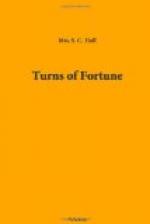“Why did you not put me in mind to write to Mr. Lycight, Mabel?” inquired her aunt, after the gate, upon which the poor woman leaned, had closed.
Mabel made no reply; but Sarah felt the hand she held tightly within hers tremble and throb. How did she then remember the days of her own youth, as she thought, “Oh! in mercy she might have escaped from what only so causes the pulses to beat or the hand to tremble!” Neither spoke; but Sarah had turned over the great page of Mabel’s heart, while Mabel did not confess, even to herself, that Mr. Lycight’s words, however slight, were more deeply cherished than Mr. Goulding’s precepts. They had a long walk to take that night, and both wept at first; but however sad and oppressed the mind and spirits maybe, there is a soothing and balmy influence in nature that lulls, if it does not dispel, sorrow; every breeze was perfumed. As they passed the hedges, there was a rustling and murmuring of birds amongst the leaves; and Mabel could not forbear an exclamation of delight when she saw a narrow river, now half-shadowed, then bright in the moonbeams, bounding in one place like a thing of life, then brawling around sundry large stones that impeded its progress, again subsiding into silence, and flowing onward to where a little foot-bridge, over which they had to pass, arched its course; beyond this was the church, and there Mabel knew they were to await the coach which was to convey them to a village many miles from their old homes, and where Sarah Bond had accidentally heard there was a chance of establishing a little school. Mabel paused for a moment to look at the venerable church standing by the highway, the clergyman’s house crouching in the grove behind. The hooting and wheeling of the old owls in the ivied tower was a link of life. Sarah Bond passed the turn-stile that led into the church-yard, followed by Mabel, who shuddered when she found herself surrounded by damp grass-green graves, and beneath the shadows of old yew-trees.




